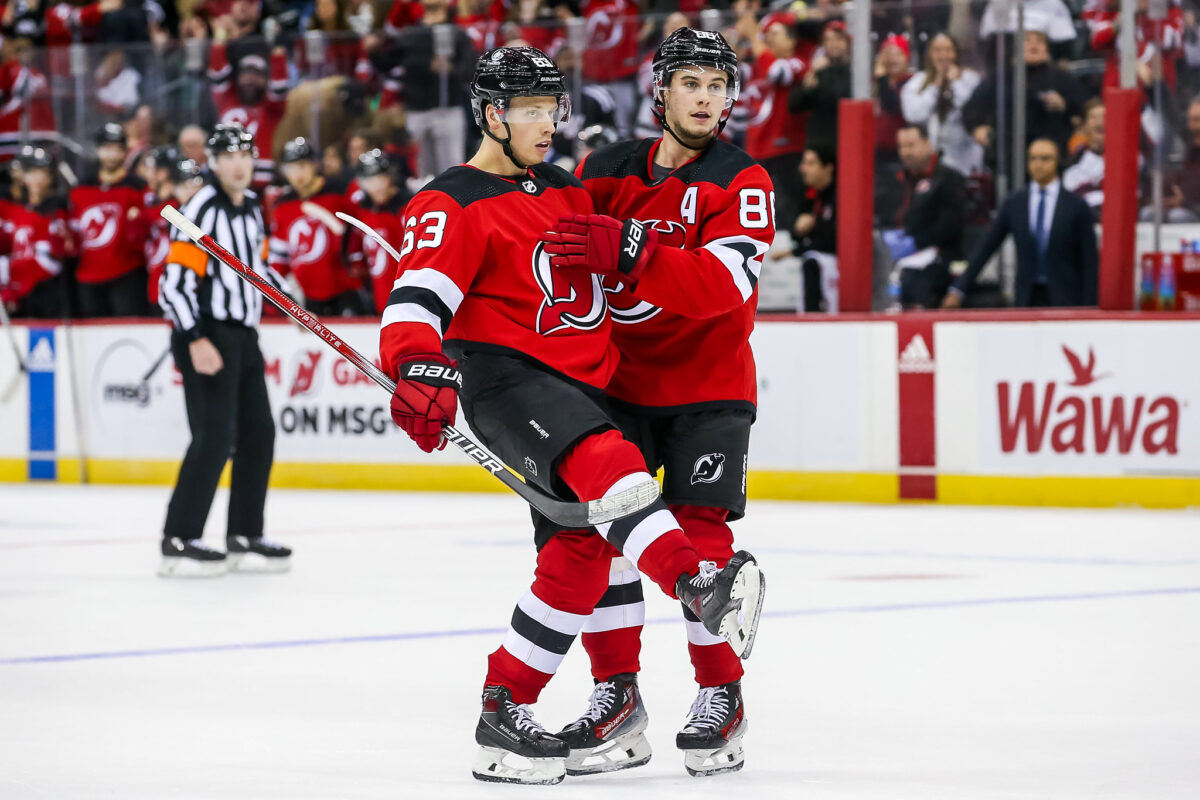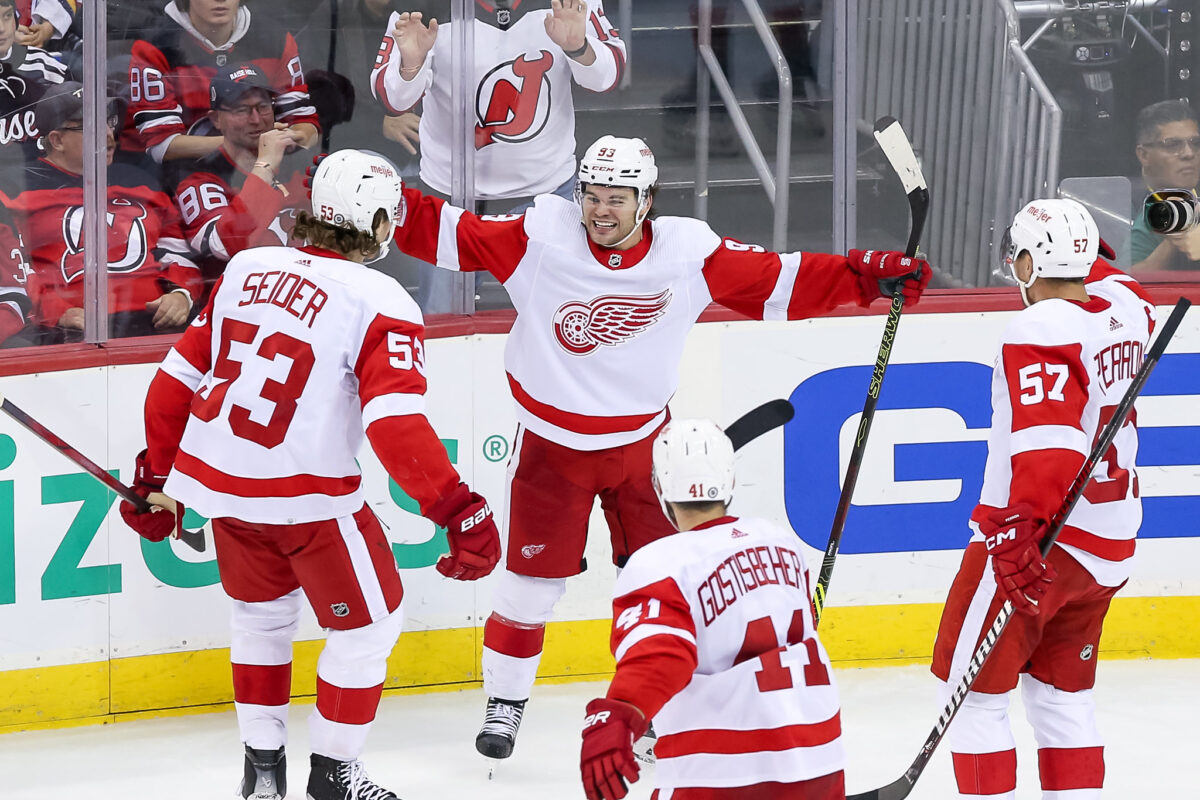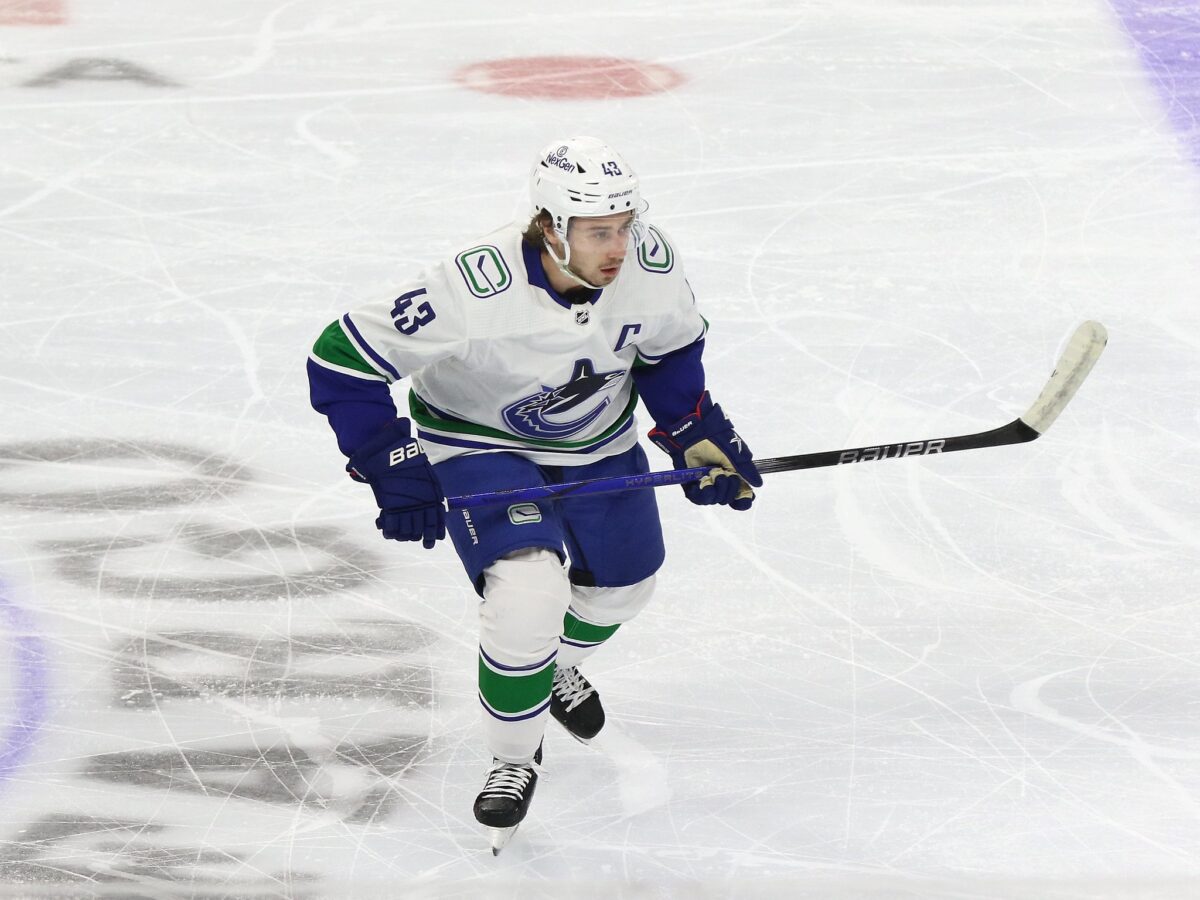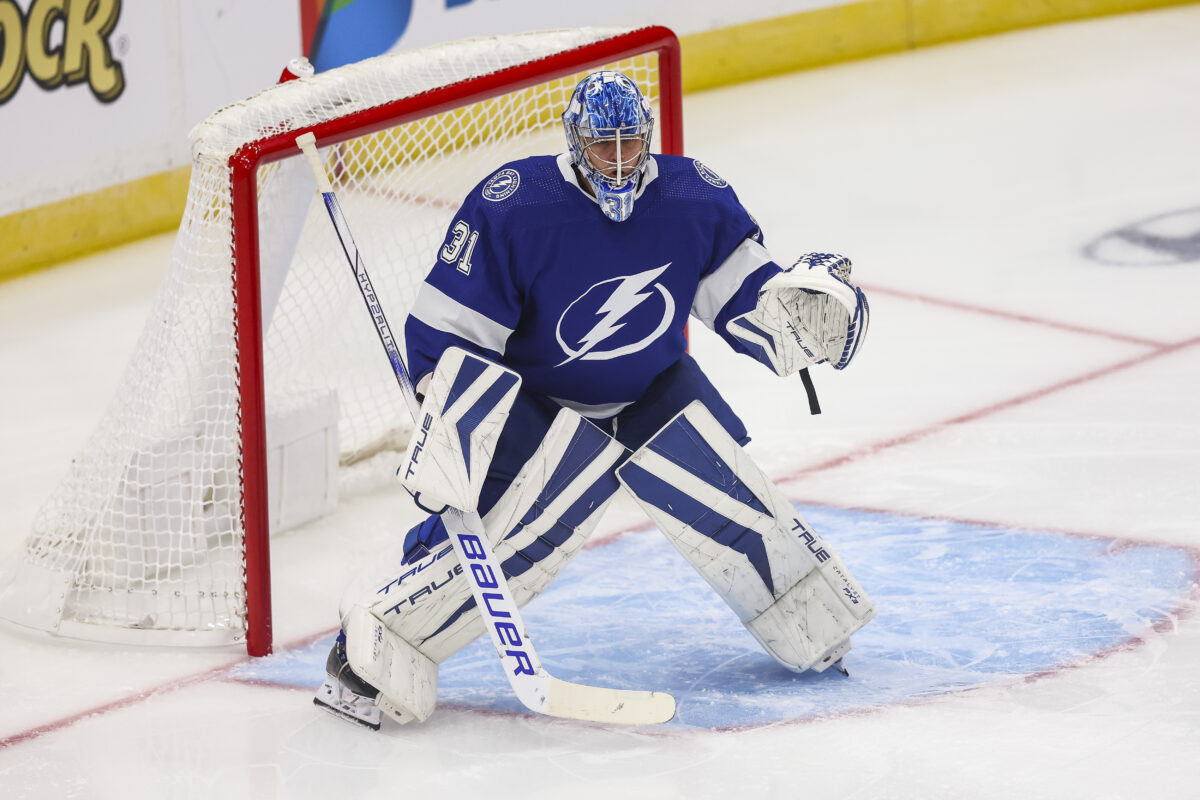With the 2023-24 NHL calendar recently turning to November, we’ve accumulated just enough of a sample size to begin picking out a few trends from around the league regarding player performance.
The start of every season is a breeding ground for overreaction. The trendy pre-season Stanley Cup picks don’t play up to the hype, projected contenders for individual awards don’t exactly come flying out of the gate, and unexpected names go on the heaters of their career before sputtering out by the end of the campaign.
Related: 14 NHLers Who Stood Out in October
It’s those latter cases that we’ll focus on, with a number of players blistering past expectations through the first month of the year. The fun part of sifting through the early-season leaderboards is trying to predict which players will maintain their high levels of play (within reason), and who will crash back down to Earth.
With that, let’s dive into five names making waves around the league for the right reasons and try to figure out: who’s for real and who’s not?
Jack Hughes, New Jersey Devils
Before we dive into his season to date I should note that New Jersey Devils center Jack Hughes was forced to leave the team’s most recent game against the St. Louis Blues (Nov. 3) after colliding with the boards. It’s a tremendous shame considering his ridiculous start to the year, so let’s hope he’s not out for long.
It’s illogical to say that a player who scored at a 100-point pace over the past two seasons is just now breaking out, but Hughes has rocketed into another tier to start the year. The American superstar currently leads all NHL skaters in primary assists (12), total assists (15), primary points (17), and total points (20) in all situations.

Hughes was seeing the most ice time of his career (20:01 minutes per game), including receiving an extra half-minute with the man advantage.
A discussion can be had about the sustainability of Hughes’ eruption around how much of his production has come on the power play (12 points) compared to during even-strength play (eight). The Devils currently own the league’s most potent power play which is firing at a nuclear 43.6% conversion rate after scoring on 17 of their 39 total opportunities.
Latest THW Headlines
Take Hughes’ on-ice shooting percentage (OiSH%) for example. It’s a metric that considers the success rate of all shots fired at the opponent’s net when a player is on the ice, both by the player himself and by his teammates. His OiSH% sits at 32% which is nearly double his previous career-high of 16.3% set during the 2021-22 season. This is due in part to each of the Devils’ five most-utilized forwards on the power play having an individual SH% of 20% or higher.
That’s not to say Hughes’ production will fall off a cliff when he returns. He’s been generating individual scoring chances and rebound opportunities at a career-best clip at five-on-five while getting unlucky with his own chances, with a 5.3% conversion rate representing the lowest mark since his rookie season in the NHL.
Hughes (eighth), Dougie Hamilton (fifth), Tyler Toffoli (14th), and Timo Meier (26th) all rank within the top-30 skaters by total five-on-five scoring chances, so the looks will keep on coming even if he can’t keep up his 164-point pace.
Final Verdict: Real
Alex DeBrincat, Detroit Red Wings
You didn’t think two-time 40-goal-scoring winger Alex DeBrincat just forgot how to put the puck in the net, did you? After a turbulent season with the Ottawa Senators in which he only scored 27 goals, the Michigan native was sent to his hometown Detroit Red Wings, via trade this offseason and looks to have a new lease on his hockey-playing life.
DeBrincat has scored nine goals in 11 games (joint-first) while forming a super-charged line with center Dylan Larkin and Lucas Raymond which has scored 5.7 goals per 60 at five-on-five (sixth among forward lines with 50 minutes played).

The grim reaper of regression may have already arrived for DeBrincat, given that he hasn’t scored or even tallied a point in four straight games, but don’t mistake that for me writing him off just yet.
The 25-year-old is an elite finisher as he sits at 14.7% for his career (just outside the top 50 league-wide since his debut) and is posting career-best shot and high-danger chance rates in all situations. DeBrincat has one of the highest ceilings in the NHL, and a third 40-goal campaign should be all but a formality at this point, even if he hits the occasional rough patch.
Final Verdict: Real
Frank Vatrano, Anaheim Ducks
If you had nine-year NHL veteran Frank Vatrano – he of a career-high of 24 goals scored in 2018-19 – co-leading the Maurice “Rocket” Richard Trophy race through the first month of the season, please give me the lottery numbers.
Vatrano’s nine goals in 10 games are probably the most unexpected development of this young season. He’s eclipsed 20 goals in a single campaign only twice in his career, and he’s already only two powerplay goals shy of his previous best of five set in 81 games with the Anaheim Ducks last season.
So, is there any hope for Vatrano to avoid going bust moving forward? According to his per-60-minute rate states, the answer is yes. Among NHL forwards who have played at least 50 minutes at five-on-five, the 29-year-old ranks 24th in shot rate, 16th in scoring chance generation, and 23rd in attempts off the rush. Not only is he getting legitimate scoring opportunities at a healthy clip, but he’s also getting them in dangerous situations where a goalie may not be as prepared.
You may also like:
- Oilers’ Skinner in Line for Vezina Trophy Winning Season
- Colorado Avalanche Won’t Be Contenders This Season
- Oilers: 8 GMs Who Would’ve Been Better Hires Than Stan Bowman
- New York Rangers’ 4 Best Contracts for 2024-25
- 3 Winnipeg Jets Who Could Earn a Roster Spot in 2024-25
While it’s true that Vatrano has been the fortunate beneficiary of favorable puck luck on the power play (60% SH%), his five-on-five conversion isn’t terribly inflated at just over 13%. Newly-minted head coach Greg Cronin is handing him around 18-and-a-half minutes of all-situations ice time per game, nearly two minutes more on average than his previous high.
If he continues to see favorable usage and line up beside offensively gifted line-mates like Mason MacTavish (12 points in 10 games) and Ryan Strome (11 in nine), setting a new career benchmark in goals should be a walk in the park.
Final Verdict: More real than not
Quinn Hughes, Vancouver Canucks
We move from one Hughes brother to another in 24-year-old defenseman Quinn Hughes, whose stat line currently reads four goals, 12 assists, and 16 points in 10 games after a five-point eruption against the hapless San Jose Sharks. Not only does he lead all NHL defensemen in virtually every offensive category, but he’s also tied for the lead in even-strength scoring among all skaters (10 points).
At this rate, Hughes is on pace to obliterate his previous career-highs of eight goals (2019-20 and 2021-22), 69 assists, and 76 points (both in 2022-23) and has emerged as the early 2023-24 Norris Trophy favorite. With the American rearguard and star center Elias Pettersson running the show (second in league scoring), the Canucks currently sit sixth in the NHL by points percentage (PTS%) and are scoring the most goals per game (4.6) this season.

With all due respect to Hughes and the Canucks, your belief in his production and the team’s success can be maintained might be determined by whether you think they can continue to convert on 34.3% of their powerplay opportunities. The 2022-23 Edmonton Oilers hold the cap-era record of 32.4%, and the franchise owns four of the top 11 full-season power plays of the era, which range from 26% to 32.4%, so the Canucks have precedent in that regard.
Also working in Hughes’ favor is that he’s currently producing career-high rates of goals, assists, primary assists, and points at five-on-five, though his shot rate is the most notable of the group. He’s firing 7.7 shots per-60 which is almost double his previous career-best of 3.9 from last season, and should insulate him from eventual regression of his sky-high 13.6% SH% at five-on-five.
Hughes and the Canucks are definitely benefitting from a volcanic run of finishing luck and numerous powerplay chances, but his underlying numbers support the assertion that the Norris hopeful has found a new gear on the blue line.
Final Verdict: Real
Jonas Johansson, Tampa Bay Lightning
When the Tampa Bay Lightning announced that Andrei Vasilevskiy – their Vezina and Conn Smythe Trophy-winning goaltender – would miss the first two months of the season, many industry experts suggested that his absence would expedite the inevitable decline of the Lightning empire.
Instead, Jonas Johansson – an unheralded free-agent signing this summer – is holding down the fort in Vasilevskiy’s stead, and his play is a significant factor in the Lightning clinging to a wildcard spot after the first month of play.

The 28-year-old netminder currently ranks 14th in save percentage (SV%), 21st in goals-against average (GAA), and seventh in goals-saved-above-expected (GSAx) among goalies to have made at least two starts this season. He’s also faced the most shots and made the most saves of anyone in the league, putting up an admirable workhorse performance.
Johansson’s performance is unexpected for two reasons. One, his NHL resumé spans fewer than 50 career games while having never played more than 15 times in a season. Two, his big-league results have been less than stellar, even in a back-up role. Despite his strong start to the campaign, he only boasts career marks of a 3.19 goals-against average (GAA) and a .896 save percentage (SV%) which rank 72nd and 78th, respectively, out of 83 goalies to have made at least 40 appearances since the 2019-20 season.
Related: 7 NHL Teams That Defied Expectations in October
Given Johansson’s priors and the fact that the Lightning are struggling to suppress opposing offenses in terms of quality (they rank 25th in scoring chances allowed per 60) and volume (31st in shots allowed per 60), count me as a skeptic. At some point, the magic will wear off, and the workload will become too overbearing.
Many goalies have gone on hot streaks before, and some have lasted as long as entire seasons, so it’ll take more than a single month of strong play to convince me Johansson has suddenly turned the corner. Great story, though.
Final Verdict: Not real
NHL’s Real or Not: Honorable Mentions
At the risk of losing the ability to explain my reasoning, here are five other honorable mentions who are getting the real-or-not treatment:
- Jakob Chychrun, Ottawa Senators (9 Games Played/GP – 4 Goals/G – 5 Assists/A – 9 Points/PTS) – Not real
- Jonathan Quick, New York Rangers (3 GP – 2 Wins/W – 0 Losses/L – 0 Overtime Losses/OTL – .982 SV% – 0.41 GAA) – Not real
- Jesperi Kotkaniemi, Carolina Hurricanes (11 GP – 4 G – 6 A – 10 PTS) – Not real
- Shayne Gostisbehere, Detroit Red Wings (11 GP – 3 G – 6 A – 9 PTS) – Not real
- Travis Sanheim, Philadelphia Flyers (10 GP – 1 G – 8 A – 9 PTS) – Real
The end of November will roughly mark the quarter-point of the 2023-24 NHL season, so we’ll have a more significant sample size with which to judge these players. Some will falter, and some will continue to rise, but for now, let me know in the comments: who’s for real and who’s not?
Data courtesy of Evolving Hockey, MoneyPuck, and Natural Stat Trick.
